Master of Social Work (By Coursework)

Objective
The objective of the Master of Social Work (MSW) programme is to produce leaders of the social work profession in various aspects such as direct practice, social policy and research, and social administration and development. Integrative learning, interdisciplinary exposure and innovative capacity building are key pedagogical features of our MSW programme.
The MSW programme is designed to facilitate students’ systematic integration of social work professional values and practice, theory and practice, and research and practice in every class. It also offers students interdisciplinary learning opportunities to take courses from other faculties and schools within the University. Students can expect to build their innovative capacity of being future-ready social work professionals who are equipped with strong and distinct leadership qualities and cross-sector mobility in the Singaporean social service sector.
Applicants may decide on two routes of admission into the MSW programme:
Local and international applicants may apply for direct admission into the MSW programme. Students are required to complete a total of 40 units with a minimum grade point average (GPA) of at least 3.0 to be awarded the degree.

Local students who are Singapore Citizen or Permanent Residents will be entitled to SSG funding subjected to eligibility, for SSG-funded elective courses.
Curriculum
| For students with a Bachelor of Social Work | For students with a Graduate Diploma in Social Work | For students without a Graduate Diploma in Social Work or a Bachelor in Social Work |
2 capstone courses:
|
2 capstone courses:
|
2 capstone courses:
|
3 core courses:
|
3 core courses:
|
3 core courses:
|
5 elective courses, with at least one elective course from the following basket:
|
5 elective courses, with at least one elective course from the following basket:
|
5 elective courses, with at least one elective course from the following basket:
|
List of courses in respective basket requirements
Candidature
| Maximum Programme Candidature | |
| Full-Time Candidature | Part-Time Candidature |
| 3 years | 4 years |
The study plan for full-time and part-time students can be referred to here.
This stackable route is only open for local applications, i.e. Singapore Citizens or Permanent Residents.
Local applicants may pursue standalone elective courses and have the units accumulated from the courses to meet the programme requirements to attain the MSW qualification. They will complete 5 elective courses before applying to be a student for the MSW programme. Upon admission, the student will complete the remaining capstone and core courses to be awarded the degree. Students are required to complete a total of 40 units with a minimum grade point average (GPA) of at least 3.0 to be awarded the degree.

Local students who are Singapore Citizens or Permanent Residents will be entitled to SSG funding subjected to eligibility, for SSG-funded elective courses.
For the elective courses to stack into the programme,
- The stackable courses must not have been used toward the award of another degree programme.
- Each course to be transferred must be read and completed within the last 4 years prior to admission.
- The average Grade Point Average (GPA) of all stackable courses which have not been used towards a degree and are allowed for grade and credit transfer to a MSW programme must be at least 3.0.
Curriculum
| For students with a Bachelor of Social Work | For students with a Graduate Diploma in Social Work | For students without a Graduate Diploma in Social Work or a Bachelor in Social Work |
2 capstone courses:
|
2 capstone courses:
|
2 capstone courses:
|
3 core courses:
|
3 core courses:
|
3 core courses:
|
5 elective courses, with at least one elective course from the following basket:
|
5 elective courses, with at least one elective course from the following basket:
|
5 elective courses, with at least one elective course from the following basket:
|
List of courses in respective basket requirements can be found here.
Candidature
| Maximum Programme Candidature | |
| Full-Time Candidature | Part-Time Candidature |
| 3 years | 4 years |
The study plan for full-time and part-time students can be referred to here.
Testimonials for Capstone Courses
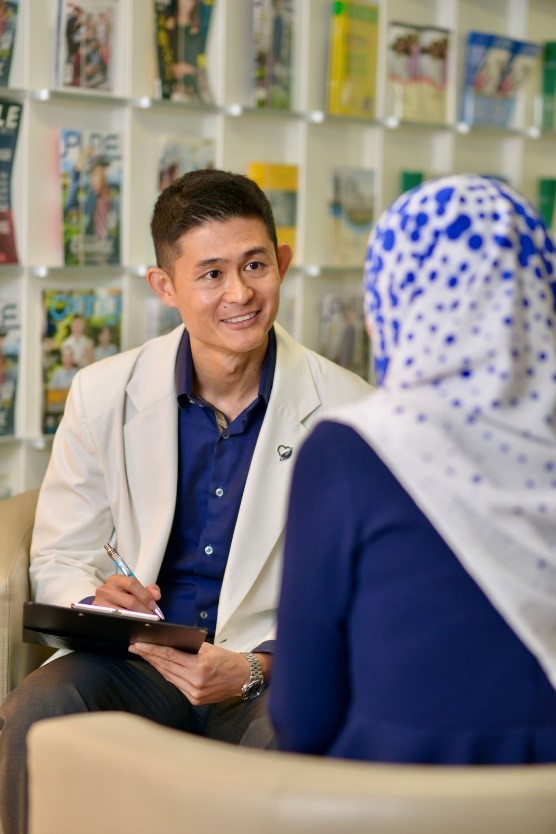 The capstone courses allowed me to experience first-hand using practice research methodologies to guide my practice, which contributed to better patient care at the hospital where I work as a Medical Social Worker.
The capstone courses allowed me to experience first-hand using practice research methodologies to guide my practice, which contributed to better patient care at the hospital where I work as a Medical Social Worker.
I especially enjoyed the space given for experimentation, and receiving peer feedback and support from my instructors’ throughout the learning exposed me to different perspectives and ideas. The knowledge and skills learnt allowed me to continue conducting my own practice research back at the hospital where I work and contribute back to evidence-based practice.
Mr Adrian Tan
Medical Social Worker
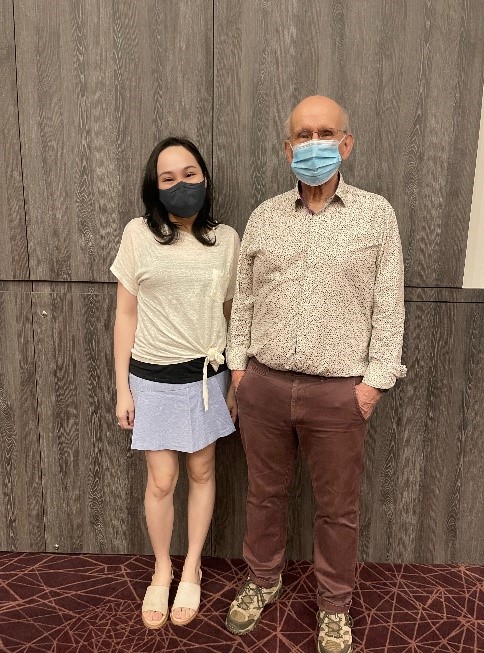 Embarking on the practice research is one of the most impactful and challenging journey that helped me reflect on the epistemologies of knowledge in a critical manner. As a moral, ethical and social endeavor, the reflexive process of practice research surfaces multiple complex issues which provokes the thinking and doing of my work professionally and personally. It is also an important contribution to the advancement of social work knowledge, understanding and context which we live in.
Embarking on the practice research is one of the most impactful and challenging journey that helped me reflect on the epistemologies of knowledge in a critical manner. As a moral, ethical and social endeavor, the reflexive process of practice research surfaces multiple complex issues which provokes the thinking and doing of my work professionally and personally. It is also an important contribution to the advancement of social work knowledge, understanding and context which we live in.
My research on kick-starting the journey of exiting the poverty cycle with low-income families and social workers reinforced an ecological lens for holistic practice. Practice recommendations include building families’ problem-solving capacities by enhancing their self-reliance and self-motivation efforts, shifting from a problem-centred perspective to a strengths-based perspective, reducing bandwidth tax and advocating for structural changes. A recursive process of helping families meet basic and long-term needs was recommended. Arising from the research, practice and policy recommendations were generated which may help low-income families more effectively.
Overall, it has been a fruitful adventure of learning which I strongly encourage anyone in the helping profession to venture into. This lifelong learning journey never ends as even after the research is completed, I continue to have reflections on the concepts and theories which are relevant to and for my work as a counsellor and social worker. Beyond thinking about what constitutes as practice research, it is vital to contemplate “what might make social work research distinctively good?” as Professor Ian Shaw encouraged us to consider about. I am immensely humbled and grateful to my mentors in this journey – Professor Choo Hyekyung, Professor Lee Geok Ling and Professor Ian Shaw.
Ms Yvonne Ang (with Prof Ian Shaw in photo)
Senior Counsellor, Manager
National Council of Social Services, Sun Ray Scheme
I have found the capstone courses a core and important set of courses for post-graduate students who want to deepen their understanding of social work practice. My experience of doing research on my current social work practices in the field has been intriguing and enriching. Through the skills and knowledge gathered from the courses, I was able to evaluate the effectiveness and usefulness of the work I did with my clients. For me, learning and establishing evidence-based practice is aligned to the essence of social work services delivery — ensuring that our practice is truly benefiting our clients and not causing harm. I appreciated learning the various research techniques and the strong emphasis for us to keep to the fidelity of the proposed methodology as well as the ethical process.
Every learning step while journeying through the courses was well supported by our trainer, A/P Choo Hyekyung. I feel that the teaching and learning were well-paced and we were equipped with the necessary skills to carry out our practice research in our work setting. It was challenging at the beginning for a practitioner like me to start working on a research piece. However, I am amazed at how much knowledge and insight I have gained through my learning experiences as I completed the modules and applied the research skills in my work.
Mr Mohamad Firoz Bin Abdul Kadir
Master of Social Work student
Testimonials for Master of Social Work
| Name: | Ms Siti Norlilah Saini |
| Programme: | Master of Social Work |
| Year: | From 2015 to 2017 |
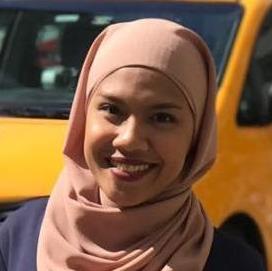 Ms Siti Norlilah Saini’s passion in Probation Services spurred her to attain a Master of Social Work degree at the National University of Singapore. She grew immensely through the coursework, a 400-hour field placement at Crossroad Youth Centre in Singapore, as well as a 12-week overseas field placement at Peace Neighborhood Center in Ann Arbour, Michigan.
Ms Siti Norlilah Saini’s passion in Probation Services spurred her to attain a Master of Social Work degree at the National University of Singapore. She grew immensely through the coursework, a 400-hour field placement at Crossroad Youth Centre in Singapore, as well as a 12-week overseas field placement at Peace Neighborhood Center in Ann Arbour, Michigan.
Ms Siti Norlilah Saini’s passion in Probation Services spurred her to attain a Master of Social Work (MSW) degree at the National University of Singapore (NUS). “I wanted to keep abreast with the latest theoretical applications to gain a wider repertoire of skills, so that I can be an effective change agent in working with youths, families, groups and the community,” said the Senior Probation Officer at the Ministry of Social and Family Development (MSF).
The MSW programme proved comprehensive, with modules offered by the Department of Social Work that were complemented with electives from other faculties. One of the highlights for Norlilah was learning from highly experienced and knowledgeable lecturers with extensive practice, research and teaching expertise. She found lessons on leadership and management theories that are specific to human service organisations to be particularly relevant. The knowledge gained will help her fulfil current duties, as well as supervisory or managerial responsibilities that may come along in the future.
Norlilah’s misperceptions of research were corrected through the MSW programme. She used to think of research as complex and difficult to undertake. But, she came to see it as a way to study an issue, understand a situation, or evaluate a service. With honed research abilities, she hopes to help develop a culture of innovation in her workplace.
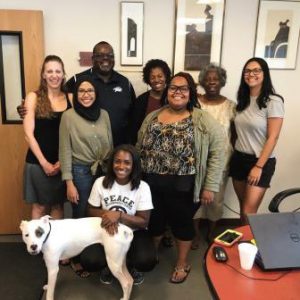 One of the objectives of the MSW programme is to offer students hands-on experience. Besides field placements in Singapore, it facilitates graduate exchange with top Social Work programmes overseas. Norlilah completed a 400-hour placement at Crossroad Youth Centre in Singapore. She also opted to do a 12-week field placement at the Peace Neighborhood Center in Ann Arbor, Michigan, This valued opportunity was made possible by a Memorandum of Understanding between NUS and the University of Michigan.
One of the objectives of the MSW programme is to offer students hands-on experience. Besides field placements in Singapore, it facilitates graduate exchange with top Social Work programmes overseas. Norlilah completed a 400-hour placement at Crossroad Youth Centre in Singapore. She also opted to do a 12-week field placement at the Peace Neighborhood Center in Ann Arbor, Michigan, This valued opportunity was made possible by a Memorandum of Understanding between NUS and the University of Michigan.
The overseas field placement challenged Norlilah to step away from her micro perspective of the world to view universal issues through a more macro, multicultural lens. She developed greater cultural competency by improving her interpersonal skills with diverse groups of people. This will greatly aid her work in Singapore where she has been increasingly meeting clients from different backgrounds.
The experience allowed her to witness how theories on family work and community building are applied in the field. She was involved in after-school programmes for children and youths, as well as the development and implementation of a summer camp curriculum for youth and families. She also shadowed a team that provides support services to residents in a housing complex.

In all, the MSW programme was enriching for Norlilah and she appreciates the NUS Department of Social Work for its support throughout. When she had to miss some classes after giving birth to her second son, lecturers offered her one-to-one consultation and mentoring. The staff also provided much needed administrative support when she went for the placement in Michigan, accompanied by her husband and their two young children.
Norlilah encourages Social Workers pondering over the MSW programme, to hesitate no longer. “Go for it! It is a platform for us to reflect on the work that we've done and how to do it better.”
| Name: | Mr Mohamed Naser Zainol |
| Programme: | Master of Social Work |
| Year: | From 2013 to 2016 |
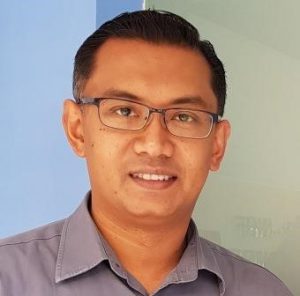
Mr Mohamed Naser Zainol enrolled in the Master of Social Work programme at the National University of Singapore to deal with a sense of inadequacy as a new entrant to the Social Work profession. He emerged more confident as a Social Worker, with skills and knowledge to manage people, navigate systems, and bring about breakthroughs.
Armed with a Bachelor of Social Sciences (Honours) degree majoring in Social Work in 2011, Mr Mohamed Naser Zainol was equipped with the right tools to help his clients at the Singapore After Care Association (SACA). Yet, he was eager to learn more. “One of my major motivations to enroll in the Master of Social Work (MSW) programme at the National University of Singapore (NUS) was a feeling of inadequacy as a new entrant to the profession,” he explained.
He found the MSW programme to be holistic, covering both micro and macro concepts, with a strong emphasis on critical thinking. It allowed him to update his skills and knowledge. It also sparked new ideas in him. He grew in his ability to manage people and navigate systems.
“The programme was highly relevant. At that time, I was still very new to managerial work, but was given a headstart by courses on human service organisations and staff management,” said Naser. He learnt to be in-tune with staff needs and how to mediate as a manager.
This knowledge has come in handy in his current role as a Senior Social Worker and the West Zone Practice Lead at the National Kidney Foundation (NKF). He manages a team of Medical Social Workers, leading them in clinical work and providing supervision. “My bosses valued the learning that I had in NUS, which gave them the confidence to deepen my job scope.”
Naser credits the MSW programme for growing his  confidence as a Social Worker, “Our classes consisted a good mix of practitioners, with new entrants to the field as well as those with at least 10 years of experience. And, we came from different sectors in Social Work. The open sharing by my classmates helped me develop an in-depth view of the profession that went beyond my job scope, reducing in me the sense of helplessness that can come with facing off unresponsive systems.”
confidence as a Social Worker, “Our classes consisted a good mix of practitioners, with new entrants to the field as well as those with at least 10 years of experience. And, we came from different sectors in Social Work. The open sharing by my classmates helped me develop an in-depth view of the profession that went beyond my job scope, reducing in me the sense of helplessness that can come with facing off unresponsive systems.”
“This broadened view, in turn, has empowered me to aid younger workers who are ‘stuck’ and need to overcome struggles of being bound by policies,” he adds. Naser also developed a keen interest in practice research as a result of his stint in the MSW programme. “I am now involved in a few research projects at NKF. It’s something that I am very interested to develop in.”
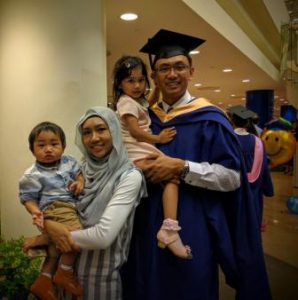
He is thankful to his employers and family for their support while he did his studies. “My wife, who is also a Social Worker, was very encouraging. We have two young kids. There were times when I found the going tough, especially with the demands of both work and studies, but my family gave me strength to go on.”
“Joining the MSW programme is one of the best decisions I have made in my personal and professional life. It positively impacted how I think, manage, supervise, and intervene across the system. This programme is a ‘must’ for Social Workers looking for a boost in competency and their career growth,” urged Naser.

